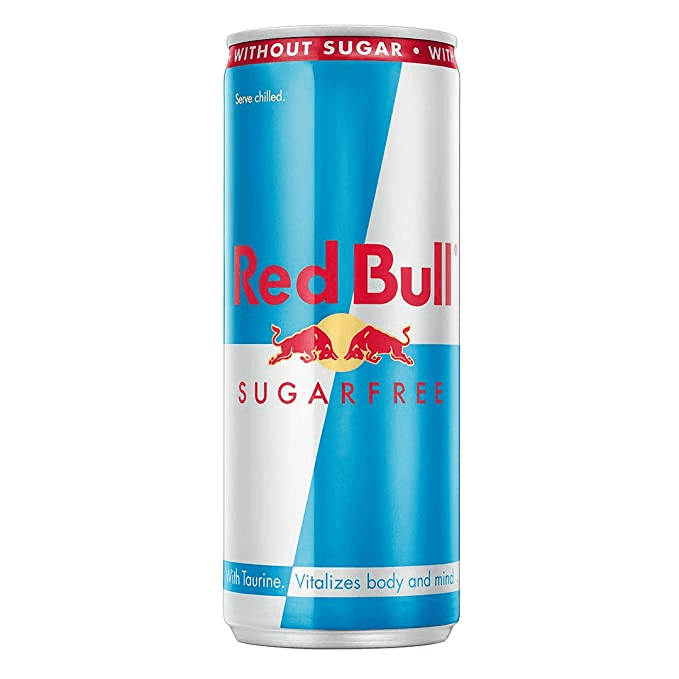Original Red Bull has sugar as one of its main components. Each can has the equivalent of 11 grams of sugar for every 100 ml. There are also Red Bull Sugar-free and Red Bull Zero, which are made without sugar but use different low-calorie sweeteners.
Red Bull taste can be perplexing. I remember the first time I ever had the original unflavored Red Bull. I found myself flipping the can around to read the contents, as I couldn’t immediately place what kind of sweetness I was tasting. Several sips along, I realized I could not possibly taste the sugar alone, so I allowed myself to enjoy the drink’s citrusy, fizzy sweetness.
There is now Red Bull without sugar that tastes almost the same, which makes it even more confusing. If you’ve ever had both Red Bull original and Red Bull sugar-free, you probably know that the sweet difference is not so much the initial taste but in the aftertaste. I find the topic intriguing and so have done some research on it. In this post, I’ll be sharing a summary of all the interesting things that there are to know about the sugar in Red Bull, so read along and maybe learn something new.
Does Red Bull have sugar?
Yes, regular Red Bull has 11 grams of sugar in every 100 ml of the energy drink. According to the company, the sugar in their drinks is comparable to that in apple or orange juice, which tops out at 10 grams per 100 ml. Red Bull Zero and Red Bull are sugar-free that have no sugar. These use sugar substitutes that mimic sugar sweetness without adding calories. The energy drink still works great, as all the other ingredients remain the same.
What type of sugar does Red Bull have?

Red Bull Energy Drink has refined table sugar, which is pure, crystallized sucrose. Although sugarcane and sugar beets have the highest concentrations of sucrose, it is also naturally present in dates, honey, and maple sap. The sucrose in Red Bulls is sourced entirely from sugar beet plants.
This is significant for some Red Bull customers because unlike sucrose from sugarcane, sugar beets sucrose is not typically treated with bone char to produce pure white crystals. Although there are no bones in the finished sugarcane product, some vegans and many vegetarians who aim to reduce animal suffering value this distinction.
How much sugar does a can of Red Bull have?
|
Red Bull drink size |
Sugar amount |
Percent AHA recommended daily added sugar intake per can (women) |
Percent AHA Recommended Daily added sugar intake per can (men) |
|
8.4 fluid ounces |
27 grams |
113% |
75% |
|
12 fluid ounces |
39 grams |
163% |
108% |
|
16 fluid ounces |
50 grams |
208% |
139% |
|
20 fluid ounces |
63 grams |
263% |
175% |
From this table, it is clear that the American Heart Association (AHA) does not recommend the regular use of drinks that have high amounts of added sugar, such as Red Bull.
Is there Red Bull without sugar?

Red Bull offers sugar-free beverages, such as Red Bull Sugar-Free and Red Bull Zero. These use the artificial sweeteners sucralose, acesulfame K, and steviol glycosides as opposed to sugar. Acesulfame K, or Ace K (Acesulfame Potassium in full), is a synthetic sugar substitute with no calories. Because it is around 200 times sweeter than sugar, only a tiny quantity of Acesulfame K and Sucralose is required to equal sugar.
These sweeteners have undergone extensive research and have been found to be safe. The Joint FAO/WHO Expert Committee on Food Additives (JECFA), the European Food Safety Authority (EFSA), and the United States Food and Drug Administration (FDA) have determined that they are not harmful to adults and children. You can safely consume up to the Acceptable Daily Intake (ADI) of 40 to 50 milligrams per kilogram of your body weight (mg/kg) per day. Red Bull Zero and Red Bull Sugar-free contain such minute amounts of these sweeteners in each can. It’s unlikely you’ll ever get to that limit in a day.
Is the sugar in Red Bull good for you?
As Red Bull has high amounts of sugar, frequent and extreme intake may increase your risk of a myriad of health complications.
Although the FDA recommends about 50 grams of sugar per day for an adult on a 2,000-calorie diet, the American Heart Association (AHA) has even stricter recommendations. According to them, adult women should only have a maximum of 6 teaspoons, or 24 grams, of added sugar in their daily diet, while men can go up to 9 teaspoons, which is equivalent to 36 grams a day. Based on the AHA recommendations, no one should have more than one 8.4-ounce can of regular Red Bull a day or make it a daily routine.
Along with harming your heart, regular Red Bull’s sugar content also increases your chance of type 2 diabetes and has detrimental effects on your kidneys’ function. One to two servings of sugar-sweetened drinks consumed daily were found to significantly raise the risk of type 2 diabetes by 26 percent, according to studies. While occasionally using Red Bull is probably not going to harm your kidneys, regular and excessive consumption may. According to research, consuming a lot of sugar raises your risk of developing chronic renal disease.
Conclusion
When all is said and done, it remains a fact that Red Bull is an appreciated pioneer in the field of energy drinks. Where performance, focus, and memory are required, even 8.4 fluid ounces of Red Bull have been shown to enhance output significantly. Arguably, it is more than coffee and sugar in a can. Where sugar has, over time, developed a bad reputation, safer sugar substitutes that mimic the all-important sugar taste are being adopted. However, for diehard Red Bull fans, it’s the original taste with sugar or nothing.
FAQs
Is the amount of sugar in Red Bull healthy?
The amount of sugar in Red Bull is not healthy. Moderation is therefore advised.
Are there sugar-free Red Bull energy drinks?
Yes, you can get Red Bull Zero or Red Bull Sugar-Free, which have zero-calorie sugar alternatives such as sucralose, acesulfame K, and steviol glycosides.

